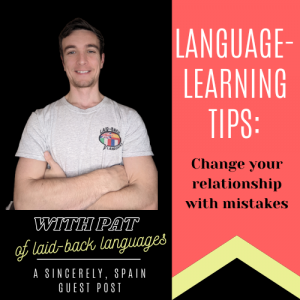
Language-Learning Tips: Change Your Relationship with Mistakes
Today we welcome to the blog Pat, the founder of Laid-back Languages. Pat caught our attention on Instagram and has since inspired us with his story about how he came to love language-learning so much that he now coaches others along their language-learning journeys of four different languages. We loved learning about Pat’s unique approach to learning a language and quickly knew we wanted to share his wisdom with you. Without further ado, let’s hear what Pat had to say…
Anyone can learn a language – Pat’s Story
 Hi! My name is Pat, founder of Laid-back Languages.
Hi! My name is Pat, founder of Laid-back Languages.
I was born and raised in beautiful Southwest of England in a monolingual family just speaking English. Now I am a qualified psychotherapist, fluent in 6 languages.
I had always loved the idea of learning to speak a foreign language, which is why I studied French at school for 7 long, arduous years up until I turned 18.
Aside from Psychology, French was my favourite subject and I studied HARD for my exams. So you can imagine my surprise when I received the LOWEST grade in my class (an E). I couldn’t speak or understand the language.
What was worse, was that my peers who did manage to pass, couldn’t speak the language either! We were all terrified of committing errors when talking and would always run away from the French assistant when it was our turn to do speaking practice.
That was 11 years ago. Fast forward to 2023, and I have learnt not only French, but also Spanish, Italian, Portuguese and Malay.
I am a self-taught polyglot and now teach people languages and enable them to become fantastic language learners.
My clients are people who have always wanted to learn a foreign language, but never believed it was possible for them.
“I’m not smart enough to learn a foreign language” being a common catchphrase.
Emotional Intelligence
 Over the past 3 years of running Laid-back Languages, I have found that what prevents most adults from getting fluent in a foreign language actually has NOTHING to do with their IQ or memory…
Over the past 3 years of running Laid-back Languages, I have found that what prevents most adults from getting fluent in a foreign language actually has NOTHING to do with their IQ or memory…
But EVERYTHING to do with their EQ (Emotional intelligence), self-belief, and relationship with making mistakes. Today, I want to talk to you about the latter.
Since completing a 4 year diploma in counselling and psychotherapy, I have learnt a lot about myself. Thanks to this process, I discovered one of the biggest factors of my language learning success was my relationship with making mistakes.
I went for being terrified about mispronouncing a word in French, to making sure I MADE at least 30 mistakes during my 45 minute Malay lesson. Yes, you read that right. Now I actively try to make mistakes when I am in class.
I no longer even call mistakes, ‘mistakes’ but ‘learning points.’ The fact of the matter is, if you are going to learn a language you NEED these learning points, and lots of them!
Heal your relationship with mistakes
So, how would you also like to get over your fear of speaking by changing your relationship with mistakes when learning a language? Get your scuba diving gear on, because we are going to dive a bit deep.
At school, we are conditioned to demonise our mistakes. Mistakes = bad grade. Bad grade = angry teacher. Angry teacher = angry parent.
The conditioning runs deep.
This is where the personal development side of language learning comes into play. You want radical results? You need to take radical action. That radical action is as follows:
What NOT to do:
 When you make a mistake and get corrected, DO NOT start berating yourself.
When you make a mistake and get corrected, DO NOT start berating yourself.
“I should have known that”.
“I am stupid”.
“It’s too hard, I’ll never learn this”.
Believe it or not, these are old beliefs you have picked up when you were a child. Turning mistakes into monsters, something which they simply are not.
When we tell ourselves off for making a mistake, our bodies go into a state of stress which is TERRIBLE for learning a new skill.
You want to feel relaxed and joyful when learning a language; not angry, upset, anxious etc.
What to do instead:
Breathe. As soon as you get told by the teacher what you said wasn’t right, breathe. Do not entertain whatever the mind is saying to you.
Your mind’s job is to protect you, so it too is innocent but what previously helped you to survive as a kid at school no longer serves you.
(I did say we’d be going deep; you were warned!)
Your job is to breathe and place your attention on the uncomfortable feeling in your body. When I make a mistake, I get a pang in my stomach area and sometimes my face gets hot. There is nothing wrong with these feelings, it is just energy in the body.
Your job is to become aware of the feeling and as you breathe out, let it go. Let go of ANY thoughts the mind comes up with, just repeat the correct way of saying the word and move on with the lesson.
Yes, it may feel uncomfortable at first. But trust me, the more often you do it, the easier it will become. What is really cool about it is that the negative thoughts themselves will disappear and new beliefs will begin to form.
You may still get the pang in your stomach when you mess up. But there won’t be any negative story to go with it and in less than a second you’ll be onto the next word or phrase.
This is where your learning will really take off. You will become a machine. There really is no stopping a learner who has a neutral relationship with their mistakes.
What I do when I make mistakes
When I make a mistake during a conversation, I don’t dwell on it. Sometimes I’ll realise I have made a mistake and because of this extra space between the emotion and my thoughts, I can easily self-correct.
On a practical level, it literally looks like me thanking whoever has corrected me, repeating the correct way of saying the word or phrase, and moving on with the conversation. FAST.
This is the power of having a raised EQ. I put my attention on the energy in my body, not getting caught up in negative thoughts which maximises my ability to learn new words.
This relaxed flow state makes it optimal for my brain to learn new words and is one of the secrets to my success as a learner.
HOWEVER, sometimes you CAN’T correct it in the moment…
 My biggest blunder (and funniest)
My biggest blunder (and funniest)
WARNING: CONTAINS RUDE WORDS
It’s 2015, I’ve just moved to Spain and am about to order a roast chicken from an elderly Colombian woman. I had just learnt that in Spanish we have to agree the genders of nouns and adjectives, if they are masculine (O) or feminine (A).
All I need to say was the following:
“Hola. Quiero un pollo entero por favor.”
“Hi. I want a whole chicken please.”
Simple enough, right?
The problem is that I was so concerned about agreeing the gender of the words, I messed up and said ‘polla’ (d*ck) instead of ‘pollo’ (chicken).
What’s worse, is that because I was so focused on matching the endings, I looked this poor lady with a completely straight face and asked for “una polla entera” (a whole d*ck).
You can imagine my horror when I later learnt what a polla was a few months later…
Learn Spanish with Laid-back Languages
 How would it feel to speak Spanish fluently?
How would it feel to speak Spanish fluently?
How much would your life change if you could communicate in a language spoken by well over 500 million people?
Do you daydream about being in Spain, chatting away with the locals at the bar? Ordering in Spanish at your favourite restaurant?
At Laid-back Languages, we work 1-1 with people who are excited and ready to change their lives forever by truly learning a foreign language.
We understand the pains of trying to learn a language and help people with ZERO previous experience, to understand and speak Spanish. (Many have gone on to learn the language FLUENTLY!)
So, if you’re interested in learning Spanish properly with no gimmicks or boring grammar and would like more information about the courses offered at Laid-back Languages.
Our courses fun, affordable and focus on speaking and listening so you’ll be chatting Spanish from the first minute whilst receiving 1-1 coaching from Pat.
Sound good?
Send us an email with subject “SPANISH COURSE” and we’ll get back to you with more info.
Email: laidbacklanguages@gmail.com
For more language learning tips and tricks check out:
FACEBOOK : https://www.facebook.com/laidback.languages
TWITTER: https://twitter.com/laidbacklang
INSTAGRAM: https://www.instagram.com/laidback.languages
WEBSITE: http://laidbacklanguages.com/




